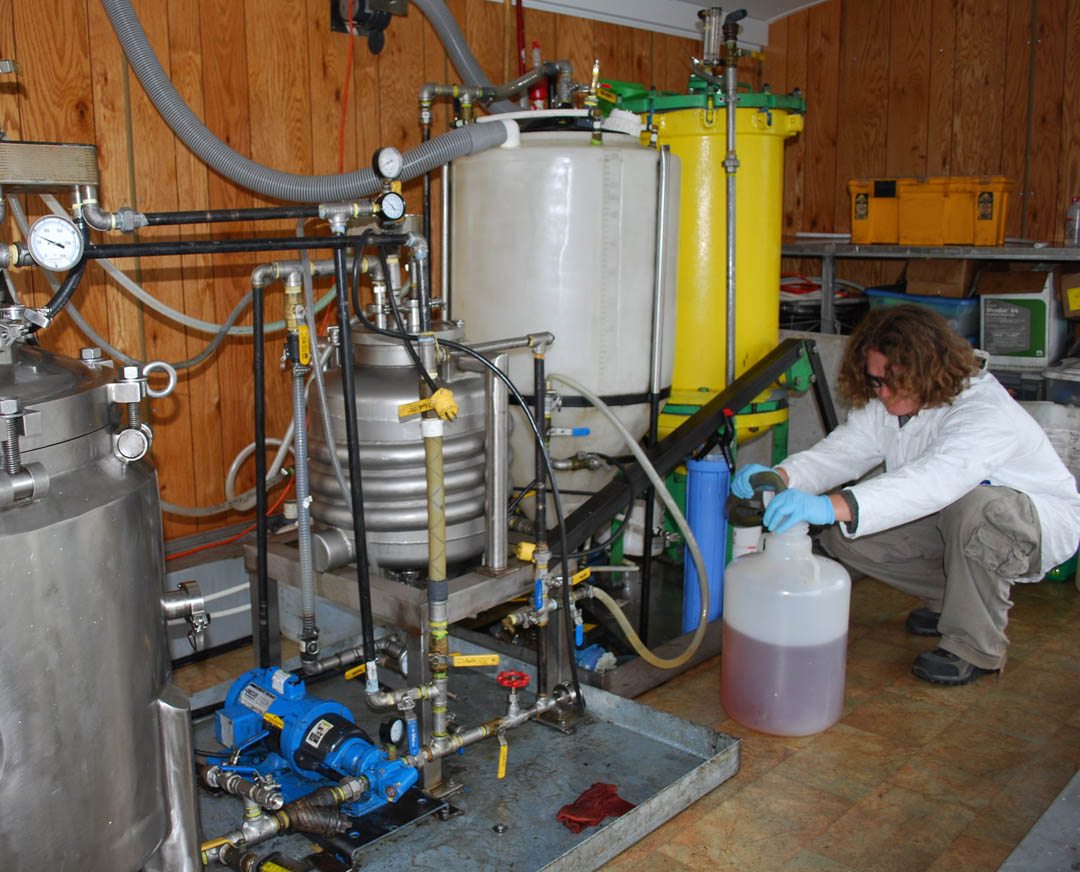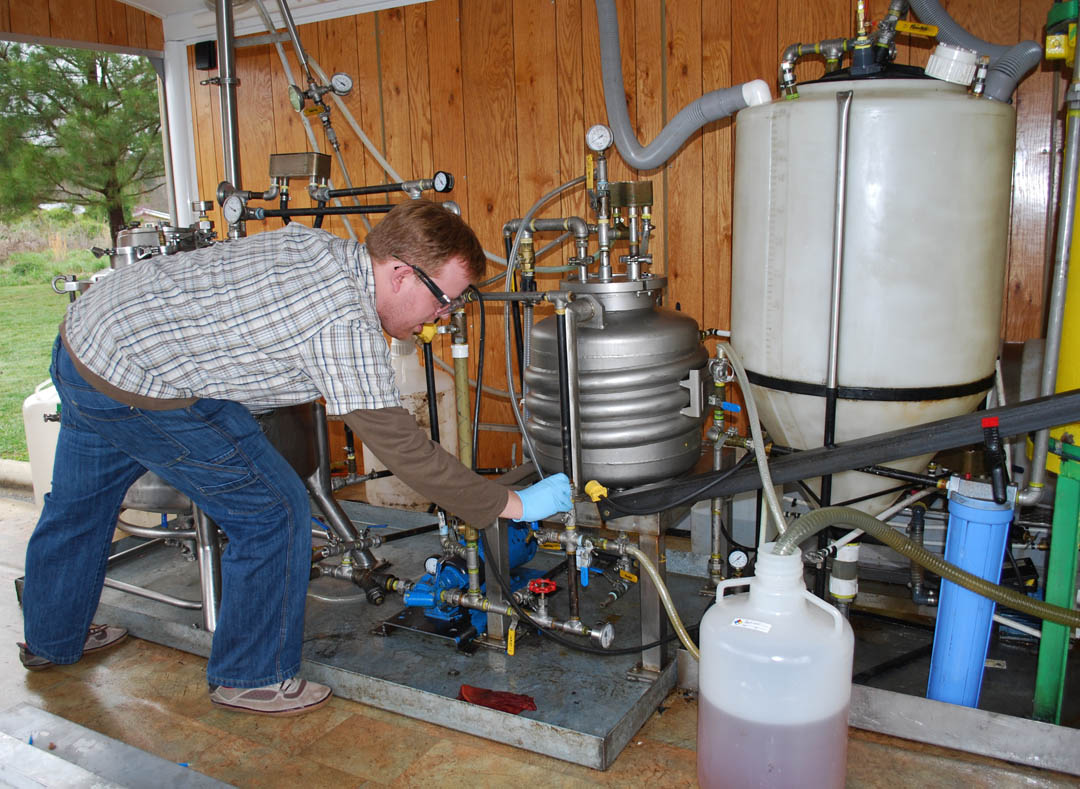College News
CCCC primes the biofuels workforce pump
Notice: This article is older than 12 months. Names, contact information, programs, titles, etc. might have changed. If you have any problems please call the main college number, 1-800-682-8353, and we will be happy to direct you accordingly.

click image to enlarge ⊗
Central Carolina Community College biofuels student Jeremy Rushlow, of Moncure, fills a container ... (more)

click image to enlarge ⊗
Central Carolina Community College biofuels student Joe Jackson, of Chapel Hill, turns the valves ... (more)
03.27.2009 • College & Community • Curriculum Programs
PITTSBORO — Biofuels have been given the green flag as North Carolina and the nation begin the race toward energy independence. Everything, from farming to national security, is linked to the production and consumption of energy.
“Gaining alternatives to petroleum-based liquid fuels is now, without question, a matter of environmental, economic, strategic, and societal importance,” said Steven Burke, president of the Biofuels Center of North Carolina.
Currently, petroleum-based liquid fuels are a primary source of energy. According to the Biofuels Center, almost 6 billion gallons are used in the state annually. Petroleum is a non-renewable, polluting source. The bulk of that used in the United States is imported.
By contrast, biofuels offer locally produced, low- or non-polluting energy created from renewable sources such as plant biomass, vegetable oils, and animal waste. As production techniques are perfected, biofuels are expected to greatly reduce America’s dependence on petroleum fuels.
The biofuels industry, though still small, is growing exponentially. In 2002, only 15 million gallons of biodiesel were produced nationwide. By 2007, that figure had risen to 300 million. North Carolina’s “Strategic Plan for Biofuels Leadership” has set a goal, by 2017, of having 10 percent of the liquid fuels sold in the state come from biofuels locally grown and produced. On the national level, the American Recovery and Reinvestment Act of 2009 is to provide about $1 billion for research, development and production of biomass energy sources.
“The growing biofuels industry needs the well-trained workforce that Central Carolina Community College can help provide,” said Andrew McMahan, the college’s biofuels program coordinator.
Central Carolina was the first — and still is the only — community college in North Carolina to offer an Associate in Applied Science in Alternative Energy Technology: Biofuels. In the program, the dual focus is on biofuels knowledge and hands-on training with testing and production equipment. The result is workers prepared to step into the industry.
“We’re positioning ourselves to stay at the forefront,” McMahan said. “We’re working as closely as possible with industry to stay on top of their needs and enhancing the educational experience for our biofuels students. If you want to get into this industry, Central Carolina Community College is the place to come and learn about it.”
He said that with the Alternative Fuels Technology: Biofuels degree, graduates would be qualified to work as a plant technician or manager, lab technician, sales manager, or process coordinator. Graduates would also have the skills to start their own biofuels businesses.
The college’s Chatham County Campus has been a biofuels education leader on the East Coast since it offered its first biofuels class in 2002. Rachel Burton, who became a co-founder of Piedmont Biofuels, Inc., in Pittsboro, brought the idea of biofuels classes to the college. The company and the biofuels program have a close partnership to encourage education in the field.
“The college’s program is another way to bring more good people in that are knowledgeable,” said Greg Austic, Piedmont Biofuels research coordinator. “We want people already trained to use the equipment we have.”
The Biofuels Center’s Burke has been a pioneer in moving forward the vision of a biofuels industry in North Carolina. He is familiar with the biofuels education program at Central Carolina C.C.
“Biofuels, like any new sector important to society, requires early leadership in development, application, education and public positioning,” Burke said. “Under Andrew McMahan’s smart vision in the past few years, the work at Central Carolina Community College has show the best sort of early leadership to bring a new technology to a trained and educated public. Their program is unique in the community college system.”
The college’s biofuels degree curriculum includes biofuels analytics, biofuels waste management, bioprocessing practices, chemistry, math, and renewable energy technology. It uses an interdisciplinary approach that also requires students to study electrical control systems, industrial safety, and pumps and piping systems. Students work in a biofuels laboratory capable of a wide variety of testing and production of biofuels from various feedstocks common in the state.
“I am a strong proponent of alternative energy sources,” said U.S. Rep. Bob Etheridge, of North Carolina. “I have been to Central Carolina Community College and seen its educational leadership in this field and some of the great work they are doing. If we could put a man on the moon within a decade, we can become energy independent. The programs Central Carolina has are crucial to developing the workforce as we move forward on these initiatives.”
For more information on Central Carolina C.C.’s biofuels programs, contact McMahan at (919) 542-6495, ext. 214, or at ajmcma23@cccc.edu. For more information on biofuels, visit the Biofuels Center of North Carolina website, www.biofuelscenter.org, or the North Carolina Biotechnology Center website, www.biotech.org. For more information on bioagriculture, visit the North Carolina Community College System’s BioNetwork website, www.ncbionetwork.org.
Categories
- Admin, Faculty & Staff Category
- Arts & Entertainment Category
- Clubs Category
- College & Community Category
- College General Category
- Continuing Education Category
- Curriculum Programs Category
- Distance Education Programs Category
- Facilities/Buildings Category
- Finances Category
- Foundation Category
- Graduations Category
- Lee Early College Category
- NCCCS Category
- SGA Category
- Special Events Category
- Sports Category
- Students/Graduates Category
- Uncategorized Category
Archives

